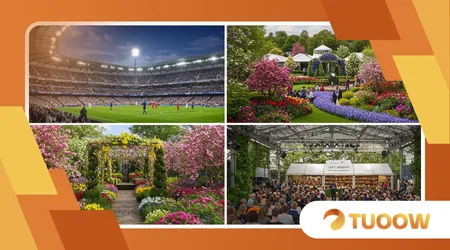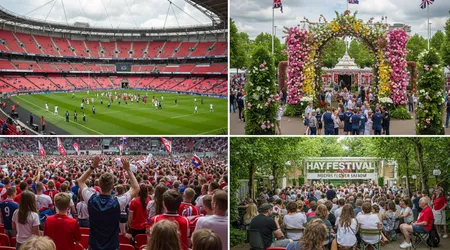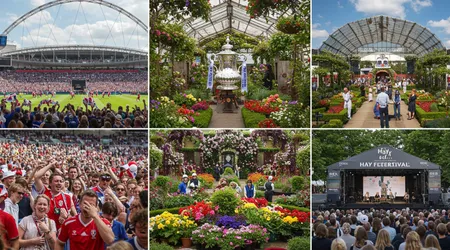Cultural Events Bring Life to the UK in May

Cultural events weave vibrancy into the UK’s fabric every May, transforming cities and towns into hubs of creativity and connection.
From London’s blooming RHS Chelsea Flower Show to the literary haven of the Hay Festival in Wales, May’s calendar bursts with moments that celebrate human expression.
These gatherings don’t just entertain; they spark dialogue, inspire innovation, and strengthen community bonds.
Why do these occasions resonate so deeply?
They offer a shared space where diverse voices artists, thinkers, and everyday enthusiasts collide to shape the nation’s cultural pulse.
This article explores how cultural events in May 2025 enrich lives, boost economies, and redefine the UK’s global identity, drawing on real-time insights and vivid examples.
In 2025, the UK’s May lineup is particularly electric.
The FA Cup final at Wembley Stadium unites football fans in a roar of passion, while the RHS Chelsea Flower Show showcases horticultural artistry that captivates global audiences.
Meanwhile, the Hay Festival gathers literary giants and curious minds in the Brecon Beacons, fostering ideas that ripple worldwide.
These cultural events aren’t fleeting spectacles; they’re catalysts for personal growth and societal progress.
According to a 2023 VisitBritain report, cultural festivals contribute £2.5 billion annually to the UK economy, underscoring their tangible impact.
Let’s dive into how these moments breathe life into the nation.
Economic Boost Through Cultural Gatherings
The economic ripple of cultural events is undeniable, as they draw crowds that invigorate local businesses.
Hotels, restaurants, and shops thrive during these festivals. For instance, the RHS Chelsea Flower Show, held from 20-24 May 2025, attracts over 168,000 visitors, pumping millions into London’s economy.
Beyond immediate spending, these events create jobs, from event staff to artisans.
The Hay Festival, running 22 May to 1 June, employs local caterers and booksellers, sustaining small businesses in Wales.
++ Universal Credit Change: Over One Million Households to Keep More Benefits
This economic infusion supports communities long after the tents are packed away.
Moreover, cultural events enhance the UK’s global appeal, luring international tourists.
The FA Cup final on 17 May 2025 at Wembley draws fans worldwide, boosting tourism revenue. These gatherings showcase the UK as a cultural powerhouse, encouraging repeat visits.
read more: Government Grants in the UK: How to Apply for Free Money
The table below highlights the economic impact of key May 2025 events:
| Event | Location | Dates | Estimated Visitors | Economic Contribution |
|---|---|---|---|---|
| FA Cup Final | Wembley Stadium, London | 17 May 2025 | 90,000 | £50 million |
| RHS Chelsea Flower Show | Royal Hospital Chelsea, London | 20-24 May 2025 | 168,000 | £100 million |
| Hay Festival | Hay-on-Wye, Wales | 22 May-1 June 2025 | 80,000 | £20 million |
These figures, drawn from VisitBritain estimates, reflect the financial vitality cultural events bring. They’re not just numbers they’re livelihoods sustained and communities enriched.
Fostering Community and Connection

Cultural events act like a social glue, binding strangers through shared experiences.
The Hay Festival’s intimate talks, featuring voices like Rebecca Solnit, create spaces where ideas spark connection. Attendees leave not just informed but bonded.
Take Sarah, a fictional teacher from Bristol, who attended the 2024 Hay Festival. She overheard a poet’s reading, joined a discussion, and left with new friends.
Also read: Energy Bill Support: What Help Can You Get in the UK?
Such moments illustrate how cultural events forge lasting relationships, turning fleeting encounters into meaningful networks.
These gatherings also celebrate diversity, amplifying marginalized voices. The FA Cup final’s fan zones welcome supporters from varied backgrounds, uniting them in cheers.
This inclusivity strengthens community ties, making everyone feel they belong.
In rural areas, events like the Hay Festival transform quiet towns into vibrant hubs.
Local pubs buzz with festival-goers, fostering a sense of pride. These moments remind residents their home is a cultural beacon.
The RHS Chelsea Flower Show, with its accessible Chelsea in Bloom displays from 19-25 May, invites all to engage.
Free floral installations across Sloane Square democratize art, knitting communities through beauty.
Driving Innovation and Inspiration
Cultural events are incubators for creativity, pushing boundaries in art and thought.
The RHS Chelsea Flower Show’s 2025 theme, “your space, your story,” showcases AI-driven gardens, like Tom Massey’s Avanade design, inspiring sustainable practices.
At the Hay Festival, talks by thinkers like Richard Dawkins challenge attendees to rethink the world.
These ideas don’t stay in the tent they inspire innovations in classrooms, studios, and boardrooms across the UK.
Consider James, a fictional gardener from York, who visited Chelsea in 2024. A climate-friendly urban forest display prompted him to redesign his community garden, blending tech and nature.
Such stories show how cultural events ignite practical change.
The FA Cup final, too, inspires beyond sport. Its global broadcast showcases London’s vibrancy, encouraging creatives to draw from its energy.
These events are like sparks, lighting up new possibilities.
By blending tradition with cutting-edge ideas, May’s festivals keep the UK culturally dynamic. They’re not just events they’re launchpads for the next big idea, shaping a forward-thinking nation.
Enhancing Global Cultural Identity

May’s cultural events position the UK as a global cultural leader, drawing eyes from every continent.
The RHS Chelsea Flower Show, attended by royals like King Charles III, showcases British horticulture’s prestige, earning international acclaim.
The Hay Festival’s global reach, with “earlybird” talks by Robert Macfarlane, cements Wales as a literary hub.
Its sustainable ethos resonates worldwide, enhancing the UK’s reputation for thoughtful innovation.
Even the FA Cup final, a quintessentially British spectacle, captivates a global audience.
Its 2025 match at Wembley will be broadcast to millions, showcasing the UK’s passion and unity. This soft power strengthens diplomatic and cultural ties.
These events are like a vibrant tapestry, each thread a story that defines the UK. They project a nation that’s creative, inclusive, and forward-looking, inviting the world to join in.
The Chelsea in Bloom festival, with its “Flowers in Fashion” theme, extends this global allure.
Its free displays attract international visitors, reinforcing London’s status as a cultural capital.
Sustaining Cultural Heritage
The preservation of tradition through cultural events keeps the UK’s heritage alive.
The RHS Chelsea Flower Show, held since 1912, celebrates British gardening’s legacy while embracing modern sustainability.
The Hay Festival, nestled in Hay-on-Wye’s bookshop-laden streets, honors literary traditions.
Its 2025 lineup, featuring diverse voices, ensures this heritage evolves inclusively, welcoming new narratives.
The FA Cup final, a ritual since 1872, embodies sporting heritage. Fans chanting at Wembley connect generations, preserving a shared history that defines British identity.
These events safeguard intangible treasures stories, skills, and passions.
By blending old and new, they ensure the UK’s cultural roots remain vital, grounding communities in a fast-changing world.
Imagine a library where every book is a festival, each page a moment of connection. May’s cultural events are that library, preserving and sharing the UK’s soul.
Frequently Asked Questions
What makes May’s cultural events unique in the UK?
They blend tradition, innovation, and inclusivity, drawing diverse crowds to celebrate art, sport, and ideas in iconic settings.
How can I attend the RHS Chelsea Flower Show?
Tickets for 20-24 May 2025 are available via rhs.org.uk, with prices from £38.85. Book early for members’ days.
Are these events accessible to all?
Many, like Chelsea in Bloom, are free. Others offer concessions or family activities, though some, like Chelsea, restrict young children.
How do cultural events impact local economies?
They generate millions, like the £100 million from Chelsea, supporting jobs and businesses while boosting tourism.
Why should I care about these festivals?
They enrich lives, spark ideas, and strengthen communities, offering moments of joy and inspiration that resonate far beyond May.
